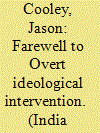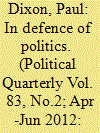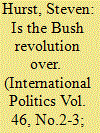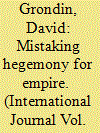| Srl | Item |
| 1 |
ID:
114067


|
|
|
|
|
| Publication |
2012.
|
| Summary/Abstract |
At times, the leaders of nations send numerous troops abroad so that governments can be created or preserved. Some of these operations are completed without much trouble, but it is important to emphasise how many turn out to be quite arduous. Most officials elect to abandon these difficult missions. This tendency was actually on display in the 1980s. At the beginning of this decade, the leaders of Iran elected to invade Iraq. As this operation commenced, Iranian officials were quite confident that another Islamic theocracy could be established inside this Middle Eastern nation. However, once multiple setbacks were experienced, this confidence began to dissipate and the initiative was brought to an end. Since the conclusion of the 1980s, only a small number of nations have made the same transition as Iran. In this article, it will be argued that the US recently became a member of this select group.
|
|
|
|
|
|
|
|
|
|
|
|
|
|
|
|
| 2 |
ID:
087269


|
|
|
|
|
| Publication |
2009.
|
| Summary/Abstract |
The prevailing opinion that the Bush administration took the United States to war against Iraq in March 2003 under false pretenses has led many to believe that Israel's security was the secret rationale for the war. According to this "war for Israel" thesis, neoconservative policymakers in the Bush administration, the pro-Israel lobby in the United States, and Israel's government all pushed the United States to go to war with Iraq for the sake of Israel's security. This article critically assesses this controversial claim and examines Israel's role in the U.S. decision to invade Iraq. I argued that while neoconservatives were instrumental in promoting the Iraq war, Israel was not their primary concern and that although American Jewish organizations and the Israeli government did largely support the Iraq war, they did not seek it or actively lobby for it.
|
|
|
|
|
|
|
|
|
|
|
|
|
|
|
|
| 3 |
ID:
112071


|
|
|
|
|
| Publication |
2012.
|
| Summary/Abstract |
The interpretation of the Northern Ireland peace process is highly controversial because it not only has implications for the future of Northern Ireland but 'lessons' are also drawn for dealing with terrorism and insurgency globally. This article reviews and critiques key interpretations of the peace process. 'The Militarists', Republican Dissidents and Neoconservatives, offer a 'fundamentalist idealist' interpretation which leads them to reject political compromise and continue to pursue victory by military means. 'The Enthusiasts' are leading figures in the Labour government who champion the outcome of the peace process and recommend 'talking to terrorists'. 'The Sceptics' argue in defence of politics and support the pragmatic realism used to negotiate accommodation. They are critical of 'The Militarists' for misinterpreting the peace process and threatening to go back to 'war'. 'Sceptics' welcome powersharing but criticise the 'Enthusiasts' for mishandling the peace process and undermining the moderate parties. This has left Northern Ireland with high levels of segregation and economic inequality that prevent the consolidation of peace.
|
|
|
|
|
|
|
|
|
|
|
|
|
|
|
|
| 4 |
ID:
086399


|
|
|
|
|
| Publication |
2009.
|
| Summary/Abstract |
Several observers have argued that the radical transformation of American foreign policy wrought by George W. Bush is already over. They argue that the 'Bush Revolution' was merely a result of the short-term conjuncture of neoconservative influence and the impact of September 11, 2001, and that this temporary deviation has been ended by the American failure in Iraq. Yet the causes of the Bush Revolution are more fundamental and long-term than this argument implies. It is in the combination of the shift to a militarily unipolar international system and the dominance of the Republican Party by its conservative wing that the real roots of the Bush foreign policy lie, and neither condition is likely to alter in the foreseeable future. Moreover, although the Iraq War has led to some shifts in policy, the Republicans' selection of John McCain as their presidential candidate confirms the continued vitality of the Bush Revolution.
|
|
|
|
|
|
|
|
|
|
|
|
|
|
|
|
| 5 |
ID:
074406


|
|
|